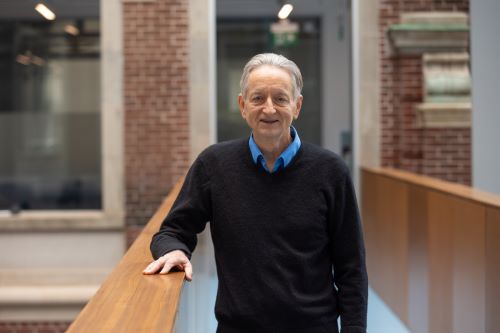Richard Gregory Memorial Lecture
Previous lecture- 2 June 2025:

Will Digital Intelligence Replace Biological Intelligence?
Geoffrey Hinton, University Professor Emeritus, University of Toronto
In keeping with the theme of AI, and following the University of Bristol being named AI University of the Year, we were pleased to welcome Nobel laureate Geoff Hinton, often described as the “godfather of AI,” who spoke about whether AI could ever replace human intelligence.
Abstract
Professor Hinton discussed a tiny language model from 1985 that showed how to unify two apparently very different theories of meaning. According to one theory, the meaning of a word is just a pattern of activation of a large set of features so it is easy to represent in a neural network that has one neuron per feature. According to the other theory, the meaning of a word lies in how it relates to other words in sentences. The tiny language model used errors in predicting the next word in a sentence to derive a learning signal. This signal allowed it to learn how to convert word symbols into feature activations and how to make these feature activations interact to predict the features of the next word. It did not store any sentences but it could complete sentences correctly, including sentences it had not seen before. Because the model was tiny, it was possible to see what features it learned and how they interacted.
The large language models we have today can be seen as descendants of this tiny model and they are by far the best model we have of how people understand language. The alien beings we are creating understand language in much the same way as we do, but because they are digital, they have two huge advantages over us. First, they are immortal: So long as the connection strengths are stored somewhere, they can survive total destruction of their computing hardware. This may give them a different outlook on life. Second, multiple copies of exactly the same neural network can look at different parts of the data and share what they have learned by simply averaging their weights. This makes them millions of times more efficient than us at sharing information, which is one reason that large chatbots know thousands of times more than any one person. Developing these digital beings to maximize short-term profits is incredibly risky.
Biography
Geoffery's father, Howard Hinton was a professor of Entomology and Head of the Department of Zoology at University of Bristol. Geoffery attended Clifton College where he was first introduced to AI when a friend introduced him to holograms and described how the brain stores memories.
Geoffrey went on to receive his PhD in Artificial Intelligence from Edinburgh in 1978. He did postdoctoral work at the University of California San Diego and spent five years as a faculty member in the Computer Science department at Carnegie-Mellon University. He then moved to the Department of Computer Science at the University of Toronto where he is now a Professor Emeritus. From 2013 to 2023 he worked half-time for Google where he became a Vice President and Engineering Fellow.
He was one of the researchers who introduced the backpropagation algorithm and the first to use backpropagation for learning word embeddings. His other contributions to neural network research include Boltzmann machines, distributed representations, time-delay neural nets, mixtures of experts, variational learning and deep learning. His research group in Toronto made major breakthroughs in deep learning that revolutionized speech recognition and object classification.
Geoffrey Hinton is a fellow of the UK Royal Society and a foreign member of the US National Academy of Engineering and the US National Academy of Science. His awards include the David E. Rumelhart prize, the IJCAI award for research excellence, the Killam prize for Engineering, the NSERC Herzberg Gold Medal, the IEEE James Clerk Maxwell Gold medal, the NEC C&C award, the BBVA award, the Honda Prize, the ACM Turing Award, the Princess of Asturias Award, the VinFuture Grand Prize, and the Nobel Prize in Physics.
